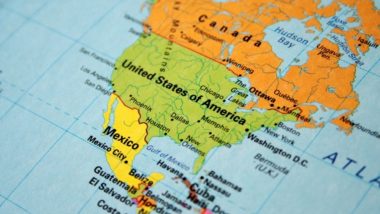Canada, Mexico and the U.S. have agreed to the terms of a new trade deal. The original 1994 North American Free Trade Agreement has been renegotiated and renamed, and is now the United States-Mexico-Canada Agreement, or USMCA.
Canadian Prime Minister Justin Trudeau tweeted after a conversation with his U.S. counterpart that USMCA will "enhance competitiveness & prosperity, while creating new jobs". Mexican President Enrique Pena Nieto dubbed the deal a "win-win-win" agreement. U.S. President Donald Trump tweeted: "The USMCA is a historic transaction!"
Late last night, our deadline, we reached a wonderful new Trade Deal with Canada, to be added into the deal already reached with Mexico. The new name will be The United States Mexico Canada Agreement, or USMCA. It is a great deal for all three countries, solves the many......
— Donald J. Trump (@realDonaldTrump) October 1, 2018
....deficiencies and mistakes in NAFTA, greatly opens markets to our Farmers and Manufacturers, reduces Trade Barriers to the U.S. and will bring all three Great Nations together in competition with the rest of the world. The USMCA is a historic transaction!
— Donald J. Trump (@realDonaldTrump) October 1, 2018
The trade agreement impacts the North American continent as $1.2 trillion worth of commerce is undertaken in annual trade between the three partners.
In a joint statement, U.S. Trade Representative Robert Lighthizer and Canadian Foreign Minister Chrystia Freeland hailed USMCA as a "modernized" agreement that "will strengthen the middle class, and create good, well-paying jobs". Mexican Economy Secretary Ildefonso Guajardo called it "a state-of-the-art instrument that will bring great economic benefits to Mexico, Canada and the U.S."
What’s New?
Car industry:
The new deal is expected to benefit car-manufacturing workers from all three countries and help spur investment in the North American industry.
The first provision requires that 75% - up from 62.5% - of the parts that go into a vehicle be made in the region to qualify for tariff-free treatment, a move intended to boost production in North America.
The second requires 40-45% of a vehicle be made by workers earning at least $16 an hour - a measure aimed at discouraging firms from shifting work to lower-wage Mexico.
Canada's Dairy Industry
Canada’s dairy industry was a sore point for the Trump Administration and the U.S. President targeted this Canadian sector from the start. Canada ended up agreeing to let in U.S. dairy producers in the new deal.
The USMCA will grant them a 3.6% slice of Canada's domestic market. It also scraps a recently implemented milk-pricing policy that had been criticised by dairy producers in U.S. states like Wisconsin and New York.
The Dairy Farmers of Canada, an industry group, claimed that 220,000 Canadians in the sector were "sacrificed" to secure a deal. U.S. negotiators had proposed the dismantling of Canada's 50-year-old protectionist dairy supply management system entirely over the course of a decade. It remains in place.
Products bought online
The new agreement raises duty-free shopping limits to products priced at $100 to enter Mexico and C$150 to enter Canada without facing import duties - well above the $50 previously allowed in Mexico and C$20 permitted by Canada.
Sunset Clause
While NAFTA had an indefinite lifespan, USMCA will expire in 16 years. The three countries will conduct a joint review six years after the deal enters into force, with an option to extend the deal beyond the initial 16-year term.
The clause setting a shelf life for the deal was a priority for Trump, who initially wanted the deal to be recertified every five years.
The new terms of the deal show that U.S. President Donald Trump has used the weight of the American market to negotiate better terms for his country but Canada and Mexico have not gained on some important fronts – on the agricultural front, the original NAFTA deal has faced criticism for flooding Mexico with cheap, subsidised U.S. products, squeezing local small farmers out of the market. The USMCA deal is unlikely to solve these challenges.
(The above story first appeared on LatestLY on Oct 02, 2018 06:38 AM IST. For more news and updates on politics, world, sports, entertainment and lifestyle, log on to our website latestly.com).













 Quickly
Quickly




















